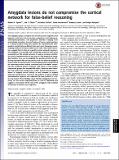Amygdala lesions do not compromise the cortical network for false-belief reasoning
Author(s)
Spunt, Robert P.; Elison, Jed T.; Dufour, Nicholas; Adolphs, Ralph; Hurlemann, Rene; Saxe, Rebecca R.; ... Show more Show less
DownloadSpunt-2015-Amygdala lesions do.pdf (877.2Kb)
PUBLISHER_POLICY
Publisher Policy
Article is made available in accordance with the publisher's policy and may be subject to US copyright law. Please refer to the publisher's site for terms of use.
Terms of use
Metadata
Show full item recordAbstract
The amygdala plays an integral role in human social cognition and behavior, with clear links to emotion recognition, trust judgments, anthropomorphization, and psychiatric disorders ranging from social phobia to autism. A central feature of human social cognition is a theory-of-mind (ToM) that enables the representation other people's mental states as distinct from one's own. Numerous neuroimaging studies of the best studied use of ToM—false-belief reasoning—suggest that it relies on a specific cortical network; moreover, the amygdala is structurally and functionally connected with many components of this cortical network. It remains unknown whether the cortical implementation of any form of ToM depends on amygdala function. Here we investigated this question directly by conducting functional MRI on two patients with rare bilateral amygdala lesions while they performed a neuroimaging protocol standardized for measuring cortical activity associated with false-belief reasoning. We compared patient responses with those of two healthy comparison groups that included 480 adults. Based on both univariate and multivariate comparisons, neither patient showed any evidence of atypical cortical activity or any evidence of atypical behavioral performance; moreover, this pattern of typical cortical and behavioral response was replicated for both patients in a follow-up session. These findings argue that the amygdala is not necessary for the cortical implementation of ToM in adulthood and suggest a reevaluation of the role of the amygdala and its cortical interactions in human social cognition.
Date issued
2015-04Department
Massachusetts Institute of Technology. Department of Brain and Cognitive SciencesJournal
Proceedings of the National Academy of Sciences
Publisher
National Academy of Sciences (U.S.)
Citation
Spunt, Robert P., Jed T. Elison, Nicholas Dufour, Rene Hurlemann, Rebecca Saxe, and Ralph Adolphs. “Amygdala Lesions Do Not Compromise the Cortical Network for False-Belief Reasoning.” Proc Natl Acad Sci USA 112, no. 15 (March 30, 2015): 4827–4832.
Version: Final published version
ISSN
0027-8424
1091-6490